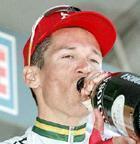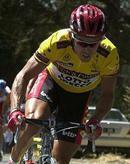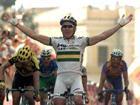
 |
 |
 |
 |
 |
 |
89th Tour de France - Grand Tour
France, July 6-28, 2002
Interview with Robbie McEwen
As ubiquitous as the 'Mc' in McDonalds
By Anthony Tan
 |
The McPocket Rocket from the Gold Coast has clocked up more wins this season than your local Micky Ds serves cheeseburgers and fries on a Saturday night. OK - it's maybe not that many, but the Lotto-Adecco rider has been winning races ever since his victory in the Aussie road titles back in January and has not stopped winning, with stage wins from the Tour Down Under right through to the Giro d'Italia. And just to show his skills aren't limited to bunch sprints, McEwen won the overall classification in the Etoile de Bessèges stage race for good measure.
When they're on their machines, pure sprinters are the fiercest of rivals, jostling for position, elbowing their opponents out of the way at 70k's an hour before that mad dash to the line. It's crazy, but McEwen thrives on the mayhem and he's psyched to do it all over again for the next three weeks, "showing that jersey off!". Cyclingnews caught up with Robbie a few days before the Tour start in Luxembourg.
Cyclingnews: With almost twenty wins this season, this must be the your best year by a long shot. Was your off-season preparation any different compared to that of previous years?
Robbie McEwen: Not much different really. I had a good rest for five weeks but kept relatively fit surfing, playing golf and rollerblading. I started serious training on December 1 and eased into it. I did a lot of kms, but easy for the first two weeks. If anything I rode more mountains in training, often going up the 8km climb to Springbrook and up the Numinbah Valley in the Gold Coast hinterland. I think my form was similar last year but I was unable to ride Nationals and Tour Down Under to show it off.
CN: After two great stage wins in the Giro, you decided to leave after stage 10. Was this with the TdF in mind? Have you had a chance to do any specific training in the mountains?
 |
RM: My withdrawal from the Giro was planned with the Tour in mind and also the fact that my wife had just given birth and needed a bit of support on the home front. I wanted to start the Tour relatively fresh which is why I only rode Catalonia and a few crits and kermesse races. Catalonia gave me plenty of time in the mountains and as the race went on I was finding my climbing legs. At least the first half of the tour is flat, although I will have to find the climbing legs again eventually!
CN: What are your thoughts on training in the high mountains for sprinters? Obviously you still need to get over the big passes within the time limit. When does it begin to affect your ability to sprint?
RM: Riding mountains is great for strength training but a sprinter needs to have that punch on the flat and leg speed. I don't find it necessary to train in the "high" mountains but in the hills is good. As long as I can get out of bed in the morning during the Tour I can normally finish inside the time limit!
The secret is to know what your pace is - mine is a heart rate around 165BPM, and on the long Alpine climbs I need to descend fast and ride good tempo between climbs. But most importantly, figure out the time limits. Before the stage I write down on the stage profile map the various estimated averages and the corresponding percentage for the time limit. As I go through the stage, I know what time the winner will do, and then I know exactly how much time I have to get to the finish.
A sprinter can always sprint but there will be a difference between one that trains his sprint and one that trains too much in the mountains - there has to be a balance.
CN: Will you be focusing on stage wins, or do you plan to challenge Erik Zabel and Stuey O'Grady for the maillot vert? Are there any stages in particular you would like to win?
RM: My focus is to win a stage, if I can do that it will mean I've been scoring points for the green jersey. If I have already won a stage I'll then look more at the points jersey and possibly the intermediate sprints as well. If I can win a stage then I don't care which one it is, preferably in the first week though.
 |
CN: How do you feel being able to wear the Australian champion's jersey all season? Were there many riders who recognised this when you returned to Europe, and do you think that European riders respect national champions from non-European countries, such as the US, UK and Australia?
RM: It's a fantastic feeling being able to wear the Aussie Champion's jersey all season and especially to take it to the Tour. I think everyone recognises the Aussie jersey in the bunch - I've a had a lot of riders tell me what a beautiful champion's jersey we have. The Euro riders definitely respect champions from non-Euro countries - some more than others - but everybody knows it's hard to win a national title. I think it doesn't matter what country you're from, but rather your standing and that of your team in the peloton. I think a good champion is one that can not only win at national level but one that can win at international level, and showing that jersey off!

